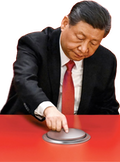"Rectifying disorderly low-price competition among enterprises" is probably the most important one. It sounds like something of the order of "houses are for living, not for speculation", the expression Xi used to announce the deflation of the real estate bubble.
Xi is saying he wants an end to "involution" ("内卷", Neijuan), a term he mentions several times in his text, and which is very trendy in China right now. Probably the best translation for it is not actually "involution" but more something akin to "rat race", "race to the bottom" or "destructive, zero-sum competition". It doesn't only relate to businesses, but also to social issues in China like the extreme competition for education, the 996 culture, the feeling of running faster and faster just to stay in the same place.
It's true that when you look at the current extreme competition in business, it makes everyone worse off: for instance China leads the world in solar because of this competition but when you look at it individual companies' margins are razor thin, making this quite the pyrrhic victory for individual Chinese companies.
Same thing for education for instance, where you need ever-higher degrees for the same jobs. What once required a bachelor's now needs a master's; everyone studies harder but no one is better off.
To call changing all this "major" is even an understatement given how deeply embedded these competitive dynamics are in all layers of Chinese society and economy. This isn't just tweaking policy at the margins: this is a bit like trying to transform a Formula 1 race into a marathon while the cars are still on the track. He's right that this is more and more of a problem in Chinese society but at the same time much of China's current architecture is built around this hypercompetitive model.
What Xi promotes instead is "high-quality development" which, when it comes to business, means innovation and differentiation rather than price wars, sustainable margins and market consolidation.
He doesn't touch much in his article about the social changes this implies but we got a preview about what that could mean a couple of years ago when China banned the tutoring industry - an attempt to break the education arms race where parents were outcompeting each others to give their kids every possible edge, which wasn't good for the kids and the families' wallets. A typical example of "Neijuan."
Let's see how this all materializes but the one thing is sure: the level of ambition here is staggering, even by Chinese standards.
https://xcancel.com/RnaudBertrand/status/1967520398112878698
 please Xi
please Xi